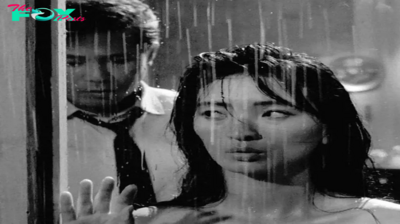Entertainment
HBO’s Like Water for Chocolate Is a Lavish Melodrama of Passion and Politics
Like Water for Chocolate is a story submerged in tears. A striking scene from HBO’s new adaptation of Mexican author Laura Esquivel’s classic debut novel sees guests at a wedding banquet weep uncontrollably after tasting a cake infused with the baker’s sorrow. Then a storm rolls in, and it’s as though nature itself is joining in the lamentation. The miniseries opens with a set piece depicting the birth of its heroine, Tita de la Garza (Azul Guaita). Chopping onions in the kitchen of the family’s ranch, her mother, Mamá Elena (Irene Azuela), is so overcome by tears that she goes into labor. Elena’s water breaks like a waterfall. Delivered on a table, Tita is, as the narrator, her great-niece, puts it, “literally pushed into this world by an impressive torrent of tears.” When the liquid evaporates, 11 kilos of salt are harvested from the kitchen floor.
Emotional, fantastical, and a little bit gross, the moment encapsulates the spirit of both Esquivel’s Como agua para chocolate and the six-part, Spanish-language series, which premieres on Nov. 3. Like Water for Chocolate is a melodrama in the best possible sense of the word—a larger-than-life historical epic of love and lust, birth and death, duty and destiny. Six years in the making, HBO’s version justifies its existence, three decades after the release of an excellent big-screen adaptation that became one of the highest-grossing foreign-language films in U.S. history, by embracing that melodrama, with all the intensity and sensuality it brings. Head writer Francisco Javier Royo Fernández and showrunner Jerry Rodríguez (part of a team of executive producers that includes Salma Hayek Pinault) also make the inspired and smartly executed decision to expand the story’s engagement with the political upheavals of its time.

Though it dips back, now and then, into the 19th century, Tita’s saga takes place largely during the Mexican Revolution of the 1910s. As a child playing in the cornfields while her widowed mother fights to maintain their struggling ranch, she falls instantly and unshakably in love with a neighbor boy, Pedro Múzquiz (Andrés Baida). But Mamá Elena is still nursing an old grudge against Pedro’s rich, ruthless father (Mauricio García Lozano). Besides, she has no intention of letting Tita—whom she despises, for Mysterious reasons—wed, when she has already ordered her to stay home and care for Elena until her death. Instead, the matriarch cruelly strikes a deal to marry off her stiff eldest daughter, Rosaura (Ana Valeria Becerril), to Pedro. (An amorous third sister, Gertrudis, is played by Andrea Chaparro.) He agrees, because at least the marriage will allow him to see Tita regularly, condemning them both to years of torturous proximity. Tita channels her repressed emotions into the culinary feats she performs alongside the family’s cook, Nacha (Ángeles Cruz), who shows her more maternal affection than Elena ever has.
So far, so faithful to previous versions of Like Water for Chocolate. But with more time to flesh out secondary characters, and to capture the sweep of History, this telling casts light on the servants whose work powers the De la Garza and Múzquiz ranches. We flash back to Nacha’s youth, when her employer separates her from the man she loves. The Múzquizes’ young ranch hand Juan (Louis David Horné) challenges his mistreatment by Pedro’s father, in a coNFLict that splits both the servant’s family and the rancher’s along generational lines. These storylines have political weight in the context of a nation hurtling toward a revolution that would ultimately overthrow an authoritarian regime and establish a constitutional republic. Fernández and Rodríguez make the connection more explicit by chronicling Pedro’s radicalization while away at school and the way he chafes against the elitism of his ruling-class, Military-aligned family.

With only two episodes screened for critics, I can’t say for sure whether the show succeeds in wedding Politics and passion, but it does get off to a promising start. Tita’s, Pedro’s, and Juan’s fights against their tradition-bound parents mirrors a revolution that challenged a hierarchical old order. Like Water for Chocolate is, at its core, a story about self-determination, and about the horrors, violent and otherwise, that can ensue when those with power deny others autonomy.
Still, you might worry that this thematically heavy layer of narrative could weigh down a tale cherished for its voluptuous renderings of romance and food. It doesn’t, thanks largely to the series’ sheer maximalism. It just feels bigger, richer, and more elaborate than the feature, which was made for something like $2 million and cut down to a palpably rushed 105 minutes for American audiences by Harvey “Scissorhands” Weinstein, with room for more of everything. That includes many sumptuous cooking scenes, shot with all the care of Chef’s Table, in which Tita funnels her love into golden cream fritters and her devastation into pastel-pink icing.
The film’s indie aesthetic might make it the more tastefully restrained of the two adaptations; the HBO version certainly isn’t subtle with its performances or its dialogue or its lengthy passages of voiceover narration or its florid visual interpretations of Esquivel’s magic realism. But, grounded by the strength and sensitivity Guaita brings to the lead role, this Like Water for Chocolate is something at least as precious: a melodrama whose extreme emotions are tied to incisive ideas.
-

 Entertainment34m ago
Entertainment34m agoClassic Korean Movies Like Piagol to Add to Your Watch List
-

 Entertainment34m ago
Entertainment34m agoOver 60 Million People Tuned in to Watch Jake Paul vs. Mike Tyson
-

 Entertainment7h ago
Entertainment7h agoPopular Hudson Valley Italian Restaurant Addresses Closing Rumors
-

 Entertainment8h ago
Entertainment8h agoRHOBH’s Dorit Kemsley Addresses Viral Smoking Scene on Season 14 Premiere: ‘I Was Being Chased’
-

 Entertainment13h ago
Entertainment13h ago‘RHOBH’ Star Dorit Kemsley Opens Up About Crumbling Marriage to PK: ‘Agreed to Separate’
-

 Entertainment16h ago
Entertainment16h agoAmerica On CoffeeWe’re simply inviting you to take a timeout into the rhythmic ambiance of our breakfast, brunch and/or espresso choices. We’re completely satisfied everytime you cease by.“BLONDIE – RAPTURE”
-

 Entertainment16h ago
Entertainment16h agoAn Important Information to Navigating the Casting Course of
-

 Entertainment22h ago
Entertainment22h agoAmerica On CoffeeWe’re simply inviting you to take a timeout into the rhythmic ambiance of our breakfast, brunch and/or espresso alternatives. We’re comfortable everytime you cease by.“At all times Bear in mind Us This Means” Girl Gaga

















